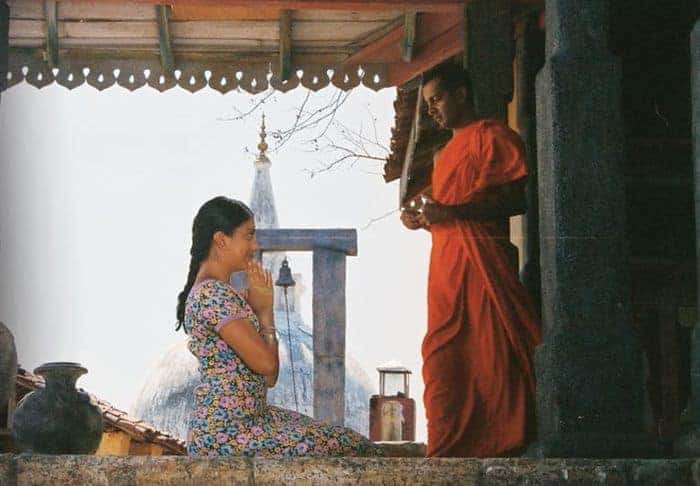スクロールダウンして、日本語の翻訳をご覧ください。
Winner for Best Screenplay from the Japanese Academy for “100 Yen Love” and from Tokyo International Film Festival for “A Beloved Wife“, Shin Adachi is mostly known for his writing works. However, since 2016, he has also started directing, with the latter being his second work, after “14 That Night”.
On the occasion of “A Beloved Wife” screening at the 19th NYAFF, we speak with him about the similarities of the story with his own life, marriage and sex, using comedy to speak about serious topics, and many other topics, in a rather sincere interview.

“A Beloved Wife” seems to include many autobiographical elements. How much of your actual self is there in Gota?
It's pretty similar. Gota's way of thinking is almost the same as mine. Some of his actions are distorted, but they're not too far from what I might do.
The film shows the difficulty of relationships in contemporary Japan. What is your opinion on the subject? Do you think there are many couples who end up married without thinking things through, resulting in unhappy marriages?
I got married without much thought. Of course, getting married means spending a lot of time with your partner, but most people are imperfect. if you spend a lot of time together, you will see a lot of imperfections in your partner. Strangely enough, even though those imperfections were attractive to me before I got married, they became the parts I disliked the most when I spent a lot of time with her. My wife used to say she loved my optimistic side, but now she hates it to death. The part of me that used to look optimistic now seems careless. My wife is nagging me to fix that, and she's as angry as my wife in the movie. But maybe that's what I can say about a happy marriage.
I think an unhappy marriage is one where you can't complain too much about the other person, and you can't say anything about what you don't like. In Japan, there is an old-fashioned commonplace of not complaining too much, especially on the wife's side. Although this is less common lately, I think it still persists. The fact that wives always have to use their husband's surname may be a sign of this. My wife didn't like her own family name, so she took mine. [Translator's note: By law, women cannot keep their maiden names.] But we still talk about this issue a lot. There is also the issue of graves. Most Japanese wives are not in the grave of their birth family, but rather in the grave of their husband's family. I can understand why many women don't feel good about these issues. If I were in that position, I would resist it very strongly.
Whether you're a husband or a wife, one of you may be patient, or worse. But you may not even be aware that you're being patient. That kind of marriage is a very unhappy one, and it has a cascading effect on the children as well. When you get married, you understand how you have been brought up. You can see clearly what you don't like about yourself, and I'm glad to have a wife who is outspoken about it.
Do you think that couples can survive routine, the lack of time and financial issues? Why is sex usually the first victim of such situations?
I think we can survive it. I think the best part of being a married couple is overcoming the repetition of daily life. I think the ideal form of marriage is if the couple are also best friends. Sex is sacrificed because, in terms of marriage being sexless, if you spend a lot of time together, you'll get bored physically. If you have sex with someone else because of that reason, I don't think you can have a good time as a married couple.
Since you are best friends and enjoy being with each other, I think you both need to find ways to make sex fun even if you're getting bored physically with each other. You might choose to have a partner just based on sex, but I think it's pretty rare for that kind of marriage to work.
In my case, I would ask for sex as a way of saying “you're very important to me”, but it's difficult because sometimes I'm told, “if it's important to you, don't ask for it now.”
The other thing that's scary in terms of sex being a sacrifice is that sex can become a device of violence, even between couples, and I think that's what I've been saying in response to the previous question, that couples should build a relationship where they can say what they don't like and still respect each other.

The film portrays both characters as victims of their situation, but also stresses their mistakes. Why did you choose this approach?
People make mistakes all the time and live with those mistakes (along with being right, of course), so I don't want to say that I specifically emphasized the mistakes of the two of them, but I think that's the natural state of human beings.
Gaku Hamada as Gota and Asami Mizukawa as Chika manage to make two unlikable characters, likeable. How did you guide them towards that goal?
I've always liked both actors very much, and I was confident that if these two took the roles, they wouldn't be someone audiences would want to turn away from. For example, the wife is always angry, but I made the character lovable by adding small details like drinking alcohol with a straw and smiling at her own anger and behavior after she gets angry, because she's strange to herself too. The same goes for Gota's grin and laugh.
The film also unfolds as a road-movie. Why did you choose this approach?
I've always liked little road movies about city people like Alexander Payne's “Sideways”. It was simply fun to watch, and I loved the way people changed in small ways before they went and when they came back.
The main premises are dramatic, particularly when one considers the implications for their child, but the movie is more a comedy than a drama. Why is that? Do you think that comedy is a better medium to speak about serious topics?
I think if you portray a normal person living a normal life, unless they are in a pretty specific and difficult situation (e.g., they don't have anything to eat, or they are being severely abused), then it has to be a comedy. Most adults know that fighting in front of children is not a good idea, but I think it's also human to do things improperly. On the contrary, I think it's difficult to portray a righteous person who can do everything properly in a comedy.
How was your cooperation with Masami Inomoto and what was your goal regarding the visual aspect of the film?
Mr. Inomoto is the type of cinematographer who captures human movement in his camera. He puts the most importance on how the actors want to move, and he tries to film the characters in a way that makes them feel. We asked Mr. Inomoto to do this because we were aiming for a film that shows people in a natural way, rather than beautiful images.
What is your opinion of the Japanese movie industry at the moment?
I think there are a lot of talented filmmakers out there, and many are trying to make films with people from abroad. I think that's a very good thing. Personally, as a screenwriter, I think it's hard to spend such little time and money on a script. I think that's the most important part of making a good film.
Also, although it's not about theatrical movies but those for internet distribution, I'm hoping projects go well since I have some projects that are going on with a certain amount of money, even though they're modest projects, that wouldn't get greenlights for movies or TV dramas.
Are you working on anything new?
I have a few projects. One is about a child and the other is about a different couple than this one. The scripts are already finished. Unfortunately, there are no production schedules yet.
「喜劇 愛妻物語」には自伝的な要素が多く含まれています。足立さんと主人公・豪太はどのくらい似ていますか?
かなり似ています。豪太のものの考え方はほぼ自分と同じです。行動もデフォルメしているところはありますが、自分ならやりかねないと思っています。
本作は、現代日本での夫婦関係の難しさを描いています。足立さんはその問題についてどのような意見を持っておりますか? よく考えずに結婚してしまって、結果的に不幸な結婚生活になってしまう夫婦は多いとお考えですか?
僕自身が結婚というものを深く考えずに結婚しました。当たり前ですが、結婚するということはそのパートナーと長い時間を一緒に過ごすことです。ただ、ほとんどの人間は不完全ですから、長い時間を一緒に過ごすとその不完全な部分がたくさん見えてきます。不思議なことに結婚前はその不完全なところも魅力的に見えていたのに、それが長い時間を過ごすことによって最も嫌いな部分になることもあります。僕の妻は、僕の楽天的な部分がとても好きだと言っていましたが、今はそこが死ぬほど憎いようです。楽天的に見えていた部分が今はだらしなく見えるようです。そこを修正しろと妻が口うるさく、映画の中の妻のように怒ってきます。でもそれが言えるのはもしかしたら幸せな結婚生活かもしれません。
不幸な結婚生活というのは相手に対する不平不満をあまり言えない、嫌なことを嫌だと言えない結婚生活だと思います。日本には、特に妻側があまり文句を言わないことを美徳とするような古い風潮があり、それが表立つことは少なくなりましたがまだ根強く残っている気がします。夫の苗字を名乗ることがほとんどというのもその表れかもしれません。僕の妻は自分の苗字が好きではなかったということで、私の苗字になりましたが、今でもこの問題で話すことは多いです。お墓の問題もあります。日本の妻は生まれ育った家のお墓ではなく、夫側の家のお墓に入ることがほとんどです。これらの問題で気分が良くない女性が多いのも、その気持ちはとても分かります。自分がその立場なら激しく抵抗すると思います。
夫でも妻でもどちらかが我慢している、最悪なことになると我慢していることにすら自覚を持てないこともあり、そんな夫婦関係というものは、子供にも連鎖していきますし、とても不幸な夫婦関係だと思います。自分がどういうふうに育ってきたのか、結婚するとよくわかります。自分の嫌な部分もくっきり見えてきますし、そこをガンガン指摘してくる妻で良かったと僕は思っています。
夫婦は、日常の繰り返しや時間の不足、経済的な問題といった逆境に打ち勝つことができるとお考えでしょうか? また、そうした状況では大抵セックスが犠牲になります。それはなぜですか?
できると思います。特に日常の繰り返しに打ち勝っていくのが夫婦の醍醐味だと思っています。理想の形は夫婦が一番の親友でもあればいいと思っています。 セックスが犠牲になるのは、セックスレスという点から見れば、長い時間を一緒に過ごせば肉体的には飽きるからでしょう。飽きたからと言って他の人とセックスしていたら夫婦での楽しい時間を成立させられなくなると思います。
親友としても一緒にいて楽しい相手なのだから、セックスも互いに飽き飽きしながらも、その上で楽しくする工夫を二人で見つけなきゃいけないと思います。互いにセックスフレンドのような相手を見つけるという選択もあるかもしれませんが、それで夫婦関係がうまくいくのはかなり稀なことだと思います。
僕の場合は「君のことがとても大切だ」という意味も込めてセックスを求めますが、「大切なら今は求めてくるな」と言われてしまうこともあるので難しいですね。
あと、セックスが犠牲になるという意味で恐ろしいのは夫婦間でもセックスが暴力の装置になってしまうことで、それは前の質問でも答えたように、嫌なことは嫌だと言える、互いを尊重しあえる夫婦関係を夫婦は築いていくべきだと思います。
二人の主人公は、彼らの置かれた状況の被害者として描かれていますが、本作は一方で、二人の間違いも強調しています。そうした描き方を選ばれたのはなぜですか?
人は常に間違いを起こして、その間違いとともに生きていくので(もちろん正しいことも共に)、二人の間違いを特に強調したと言うよりは、それが人間の当たり前の姿だと思っています。
豪太役の濱田岳さんとチカ役の水川あさみさんは、本来あまり好まれないキャラクターを、愛されるキャラクターにしています。足立監督はその二人をどのように演出しましたか? 概して、本作のためのキャスティング・プロセスはどのようなものだったのでしょうか?
二人とも以前からとても好きな俳優さんで、この二人に演じてもらえれば、目を背けたくなるような人間にはならないという確信がありました。例えば奥さんは常に怒っていますが、お酒をストローで飲んだり、怒ったあとに、自分の怒りっぷりや行動に自分自身がおかしくなってクスリと笑ってしまうというような細かい演出をところどころにつけて愛すべきキャラクターにしました。豪太のニヤニヤ笑いも同様です。
本作はロードムービーのようにも展開します。なぜこのようなアプローチを選ばれたのですか?
以前からアレクサンダー・ペイン監督の「サイドウェイ」のような市井の人々の小さなロードムービーが好きでした。単純に見ていて楽しいですし、行く前と帰ってきたときに、人間が小さく変化している様が好きでした。
本作は、特に子どもへの影響について考える場面などでは、ドラマチックな雰囲気もありますが、「喜劇 愛妻物語」はドラマである以上にコメディーです。その理由は何ですか? まじめなテーマについて語るための手段としては、ドラマよりコメディーのほうが適していると思いますか?
かなり特殊で厳しい状況に置かれている人は別ですが(例えばその日に食べるものもない状況や激しい虐待にあっている状況など)、普通に生きている人を普通に描けばそれはコメディにならざるを得ないと思っています。子供の前でケンカをするのは良くないことはたいていの大人は知っていますが、それをきちんと実行できないのも人間だと思います。逆にちゃんと実行できる正しい人を、面白く描くのは難しいと思います。
撮影監督・猪本雅三さんとのコラボレーションはいかがでしたか? 映像に関しては、どのようなものを目指していましたか?
猪本さんは、人間の動きをそのままカメラにおさめるタイプの撮影監督です。俳優がどう動きたいのか、その動きをもっとも大切にして、そして登場人物に寄り添うように撮ってくれます。美しい映像よりも、人間が自然に映っている映像を目指していたので猪本さんにお願いしました。
今の日本の映画業界についてどう思いますか?
作り手には才能あふれる人が多いと思います。その人たちがどんどん海外の人と組んで映画を作って行こうとする流れを感じます。とても良いことだと思います。脚本家として個人的に思うのは、脚本を作る時間とお金をほとんどかけないのは辛いです。良いものを作るのに最も大切なところだと思います。
あと、映画ではありませんが配信では、映画やテレビドラマでは通らないような地味で小さな企画にある程度のお金をかけて作る企画が通ることもあり期待しています。
現在は何か新しい作品を準備していらっしゃいますか?
いくつか企画はあります。脚本が出来ているものでは、一つは子供の話、もう一つは今回とは違う夫婦の話。ただ、残念ながらクランクインのめどはたっていません。















